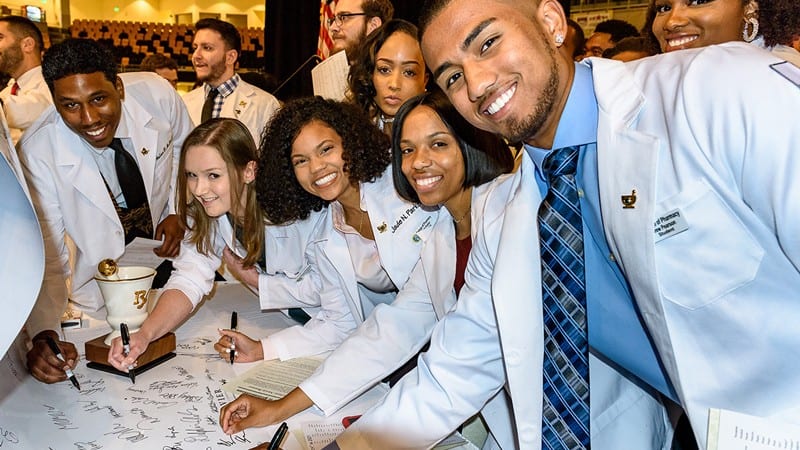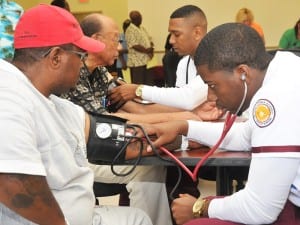From the Dorm to a Doctor’s Office: How You Can Succeed in a Career in Healthcare

UNCF-member institution Xavier University
It’s common knowledge that Black medical professionals are underrepresented in their field, but the consequences of this inequality are not as well known. According to U.S. News, “Racial disparities in health and healthcare providers persist in the U.S., and may go hand in hand.” In other words, the health problems faced by underserved populations may be caused, at least in part, by a lack of diversity in the field of professional medicine.

Xavier University
We can see the effects of this inequality both on a large scale as well as in the ways that individual patients are treated. According to research, there is evidence that racial bias in pain perception is associated with racial bias in pain treatment recommendations—meaning that Black Americans are undertreated for pain relative to white Americans.
Of course, to have more Black healthcare providers, we need more successful Black medical students. If you like science and are passionate about the health of people in your community, you’re the perfect fit for a career in medicine. Our healthcare system needs people who are sharp and logical as well as compassionate and analytical. These skills will help you enjoy a successful career as a healthcare worker and, consequently, will give you the opportunity to make a difference within your community and the medical field.
A well-paying, emotionally fulfilling career in medicine is a worthy goal, though it requires years of hard work and dedication. As early as high school, you can take steps to set yourself up for success. Take as many honors and AP science classes as possible and strive for great grades. In your free time, volunteer at a local hospital or clinic.
Once you’re in college, make sure to get connected with your health professions department, sign up for shadowing opportunities, and apply for internships that will help you narrow down what branch of healthcare you’re interested in while also boosting your resume. Check out AAMC’s resources for aspiring doctors and financial aid to get a look into what it takes to practice health professionally. Start scoping out graduate schools early and make sure you take all the classes necessary to apply to your favorite universities.
Whatever your interest, students who plan to pursue careers in healthcare will need to enroll in a bachelor’s degree program. Although it’s possible to transition from a variety of majors to a graduate school program in healthcare, it’s best to major in a health-related science, nursing, or general or specialized pre-medical (pre-med) major. Healthcare-related majors include a wide range of course subjects, which may include:
- Biology
- Chemistry
- Biochemistry
- Physics
- Calculus
- Ethics
- Psychology
- Sociology
- Statistics
- Genetics
- Public Health
- Human Physiology
Careers in Healthcare
Graduates in this field may pursue careers in a truly vast variety of capacities. Some of these include:
- Primary care doctor (family or internal medicine)
- Specialist doctor (pediatrics, sports medicine, optometry, cardiology, etc.)
- Surgeon (various specialties)
- Dentist, orthodontist, or oral surgeon
- Nurse (various certifications and specialties)
- Physician’s assistant
- Physical therapist
- Pharmacist
- Radiologic (x-ray) technologist
- Athletic trainer
- Dietician
- Medical social worker
Want to learn more about this possible career path and college major? Have questions about which UNCF colleges and universities offer degrees in healthcare? Looking for help with financing this degree?
Click Here So We Can Help You!

Bethune-Cookman University
How to Prepare for Success
In order to be successful, students in healthcare and medicine should have a strong sense of compassion and empathy for other people, excellent communication skills, a sense of accountability, and a passion for medical sciences. They should also have a high level of academic accomplishment, integrity and cultural humility, and be driven to achieve the best possible health outcomes for patients.
Schools to Consider
To enter the field of healthcare, students must at minimum earn a bachelor’s degree, but the highest-paying jobs require a master’s or doctoral degree (a research, professional, or clinical doctorate). They also require internships, residencies, and other forms of field work. These UNCF-member schools offer programs in medicine:

Oakwood University
- Xavier University of Louisiana
- Morehouse College
- Tuskegee University
- Johnson C. Smith University
- Wilberforce University
- Bethune-Cookman University
- Oakwood University
Professional Organizations
There are also many professional medical organizations that can provide more insight into some of the specializations in this discipline. A sample list includes:
- American Academy of Pediatrics (AAP)
- American Association for Physician Leadership (AAPL)
- American Association of Healthcare Administrative Management (AAHAM)
- American Association of Immunologists (AAI)
- American Association of Managed Care Nurses (AAMCN)
- American Association of Nurse Practitioners (AANP)
- American Association of Oral and Maxillofacial Surgeons (AAOMS)
- American College of Physician Advisors (ACPA)
Scholarships Available
There’s no better way to start on your path toward a successful career in healthcare than with a solid financial foundation. Fortunately, many scholarships are available through UNCF, including some specifically for majors in healthcare. Keep an eye on the UNCF website for current scholarship opportunities and announcements.
Search for specific scholarships and view those that are currently accepting applications here! Students should also check with each college or university to see if there are additional scholarships available to study healthcare.
As you explore your options, be sure to use our guide to applying for scholarships and grants. You can also receive guidance by submitting a major interest form if you are interested in a career in healthcare. Submit the form on our website to get started. And follow us on UNCF social media channels to receive notifications about our scholarships and member HBCUs. Reach out today!